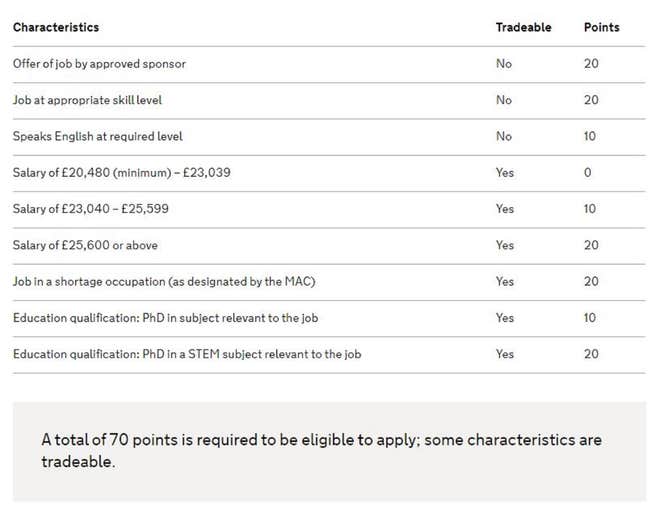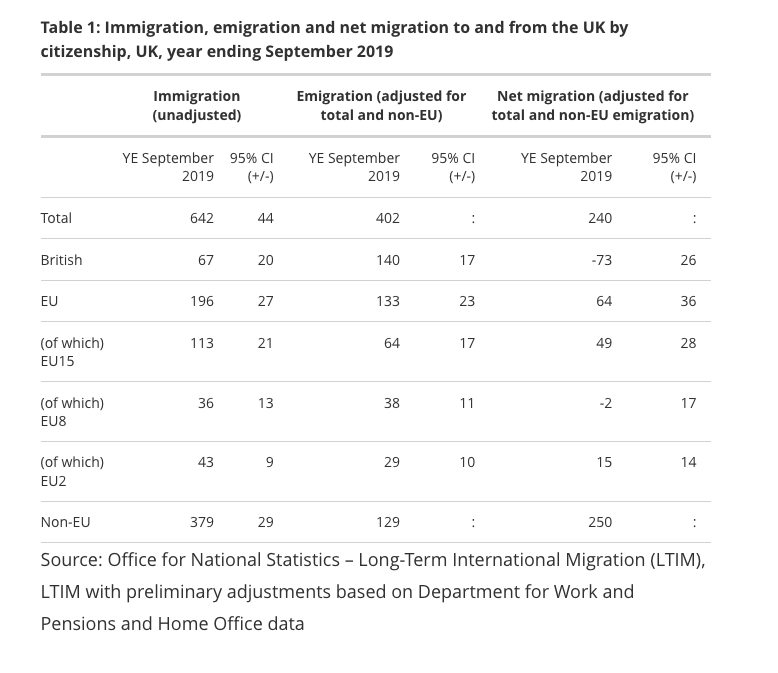Neither Brightest nor Best: The new UK Government Immigration Policy
A UK Points-Based immigration policy will begin on 1st January, 2021 when free movement into and from the EU ends. Here are the official “characteristics” of the new system in order for an applicant to achieve the magical 70 points that will allow him or her to come to Britain:

There are of course complicated adjustments and exceptions that may be applied. The UK Policy Statement (19th February, 2020), ‘Skilled Workers’ Section 6 further complicates the ground rules by stating: “In effect, applicants will be able to ‘trade’ characteristics”.
The ink, however is scarcely dry on this Government’s claim, that this is a “firm and fair points-based system”; when we discover that the firmness is obviously negotiable, and the ‘fairness’, with all this loose wording, becomes an obvious invitation to the lawyers to have a field-day with the ‘characteristics-trading’.
Of course we should not believe that this failure is because the Government will not be aware of the shortcomings in the system. This is, rather classic UK regulation: with all the hallmarks of these great British regulatory institutions that established the standard: the Financial Services Authority (extinguished hastily after the Financial Crash), or the Department of Agriculture and Fisheries (rendered extinct because it became all too obvious that it was the prisoner of the industries it was supposed to be regulating) – these failed institutions, however best represent how Britain actually prefers to do regulation in areas outside the reach of the EU: in short, British regulation is conventionally designed to fail. The British backstop has always been ‘self-regulation’ whenever Government can fudge it; but this is merely a token that regulation in Britain is almost invariably a matter of optics over reality: all fuss and no substance.
Why do I say this?
Let us look at official British immigration statistics. We are leaving the EU. EU citizens already do not feel very welcome, therefore we would expect EU immigration into Britain to fall; and it has fallen, but this is simply to miss the point. The proposition of Brexit was to take back control of Immigration, and to reduce the immigration numbers to the UK (forcefully promoted, whatever the consequences). Britain always has had control over non-EU immigration, and curiously has never done anything to use that control to reduce non-EU immigration in any meaningful way; it is just used as a self-regulating trade-off with EU immigration. We are merely now going through the process of switching from EU to Non-EU immigration, and are now in the middle of resetting the pipeline to point in a different direction. Do not expect anyone to look closely at anything. Non-EU immigration has actually increased, indeed it slowly gathering pace to replace the lost immigration from the EU. This was always going to happen. It was obvious and inevitable; indeed there can be little doubt that it was what the Conservative Government wanted to achieve; an election victory to execute Brexit (and triumphantly claim to have reduced EU immigration); with the target no doubt of not actually reducing net immigration to the UK at all.
Here are the official statistics, to June 2019 (‘000s):


Thank you for this, Mr Warren.
Opposition to the EU was couched in terms of ‘immigration’ and this word carries implications of ‘blacks, Muslims, Chinese (even ‘Irish’) and plays on the xenophobic narrative to which we have been subjected to for centuries both in our media and via other institutions like education. Although, probably a majority of the population has seen through this lie, it is the persistence of it within the media that creates an impression that it is the view of MOST of us. (In the US, President Trump simply does so in an open and unabashed way). We see this in the many ‘vox pops’ in which ‘ordinary people’, in ‘local accents’ say, “I am not racist, but, there are just too many of them around here.” So, the EU was linked to immigrants in this negative perception.
The opposition to the EU from the financial classes who supported BREXIT, was about the EU’s rule-based framework (“Red tape” in media-speak) which was, at last, beginning to turn its attention to to financial transactions. And, the narrow group, despite austerity have shovelled increasingly larger shedloads of cash and wealth in its direction, did not want this forcing them to share a fraction of their illegally gotten gains with the majority of us.
Austerity and gradual political disempowerment has also created a substantial section of the population which is significantly alienated and the anti-immigration message was couched in ways that presented to this section of the population that ‘immigrants’ were the ’cause’of their plight and, with a number of other factors, was significant in creating a Leave constituency.
Now, there are significant issues regarding the way the EU operates, particularly, its economic paradigm and this influenced a number of thoughtful people to vote Leave. (I voted Remain – believing the benefits outweighed the less attractive aspects).
Immigrants from the EU have rights, as European citizens, equal to those of us who are UK citizens, as we have if we choose to work in the EU. However, the majority of immigrants from elsewhere, do not have such rights or come from places where such rights are common. Many are fleeing from bad conditions and countries like the UK offer a perception of ‘betterment’.
Once Brexit has been fully achieved, the ‘tradeability’ of the immigration points will become dominant so that the wealthy can impose conditions to ensure cheap labour, with few rights. Coupled with the reduction in social security for UK citizens and the weakening on rights in employment, standards, etc wages for many of the UK citizens will be driven down, too.
Trump won the US Presidency on a substantial minority of the vote, because of the Electoral College. His strategy focussed on a few populous ‘swing’ states, with very targeted, but still mendacious, local messages and ‘swung’ a section of the population in these. There were other strategies like voter discouragement to reduce the vote against him.
In the UK ‘immigration’ has been one of these ideas pitched at a section of the population, coupled with some other local messages which was able to swing enough voters towards Leave and to discourage some others from voting Remain. The torrent of abuse of Mr Jeremy Corbyn over several years, plus the focus on fault lines in the Labour Party and ruthlessness towards opposition within the Conservative Party led to a substantial majority of MPs on a minority of votes.
“who is going to do the due-diligence?”
Isn’t it the British Way to outsource this kind of thing to profit-oriented foreign corporations paying slave wages? If the work is actually done at all, not just claimed for, at taxpayer expense.
I have made the argument that the EU (certainly in theory and somewhat in practice) significantly *reduces* bureaucracy because certain things are ‘free’ (like free movement), standardization means only single transnational bodies are needed (instead of being replicated throughout nations and regions), and so on, to people who are dumbfounded about such an assertion, such is the lack of analysis (and rational thought) in the UK mainstream media. The UK government has been haphazardly and hypocritically announcement bureaucratic measure after measure since Brexit, and a “points-based system” of checks is a prime example. No doubt some scrutinory process to make sure bananas are sufficiently British will not be far off.
The opposition to the EU was also predicated on Bureaucracy. Far too much. Form filling etc. Now of course we will require at least an extra 50,000 customs officers to control the borders. Plus all the extra form processors and staff to handle immigration control in the back office. All of this was declared to be ‘Project Fear’.
As the whingeing Brexiteer moaned after delay at passport control in Amsterdam ‘this is not what I voted for’ Oh yes it was!!! but that was also ‘Project Fear’
How many lorries travel between Canada and the EU on a daily basis, compared to those that travel from Britain to the EU on a daily basis? How can we have a similar trade agreement to that of Canada? there is nothing similar.
Australia has no agreement with the EU. An Australia type deal is NO DEAL. All of this combined with the immigration issues spells disaster and catastrophe. But of course that is just ‘Project Fear’
And all those poor “Leave”-ers, who were pleased to tell our darker-skinned cousins that “We voted to send you home!”.
Will they be disappointed, I wonder?
Perhaps they will be quite content when their “feed” assures them that immigration has been duly “re-balanced”.
The improbability if not the impossibility of meaningfully changing anything in the regulatory sphere has long-since made this corrupt little island a dangerous place to reside.